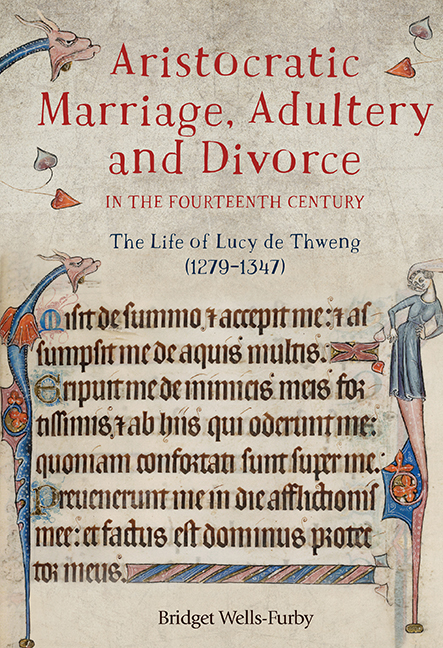 Aristocratic Marriage, Adultery and Divorce in the Fourteenth Century
Aristocratic Marriage, Adultery and Divorce in the Fourteenth Century Book contents
- Frontmatter
- Contents
- List of Illustrations
- Acknowledgements
- List of Abbreviations
- Note on the Text
- Introduction
- Map
- 1 Birth and Family; Inheritance and Disinheritance
- 2 Wardship and First Marriage
- 3 Separation and Divorce
- 4 Adultery and Fornication
- 5 Second Marriage
- 6 Widowhood
- 7 Third Marriage
- 8 Death
- Summary and Conclusions
- Bibliography
- Index
5 - Second Marriage
Published online by Cambridge University Press: 04 April 2019
- Frontmatter
- Contents
- List of Illustrations
- Acknowledgements
- List of Abbreviations
- Note on the Text
- Introduction
- Map
- 1 Birth and Family; Inheritance and Disinheritance
- 2 Wardship and First Marriage
- 3 Separation and Divorce
- 4 Adultery and Fornication
- 5 Second Marriage
- 6 Widowhood
- 7 Third Marriage
- 8 Death
- Summary and Conclusions
- Bibliography
- Index
Summary
Lucy gained her divorce shortly before July 1312, at the age of thirty-three, and within six months she was married again to Robert de Everingham. The immediately obvious questions are, why did she not marry Meinill, and why did she marry Everingham? The answers may be found by considering the position of widows because she was in much the same position, in as much as, after the annulment, she was a mature but unmarried woman in possession of land.
The remarriage of widows
Widows, as unmarried women in possession of land, were in many ways an anomaly within landholding society, whether this was only their life interest in dower and/or jointure from their late husband's estates, or whether, in addition, they had their own inheritances. Like Lucy in 1312, they performed their own homage and fealty in respect of any lands that were held in chief, usually after giving an oath not to remarry without the king's licence. A significant quantity of landed wealth was at stake because most landholders left widows. Of 501 men who received a summons to parliament between 1301 and 1400, precisely two-thirds (333) left widows, although the length of time that these women survived the death of their first or only husband varied between a matter of weeks and fifty-nine years. The important question is how far widows were free to choose whether, and if so whom, they married again. In theory, the only constraint on their choice was that the widows of tenants-in-chief were obliged to obtain the king's consent to a remarriage; in practice, it was very different.
In religious terms, widows may have been confused about what they ought to do because the church promulgated two contradictory views. On the one hand, there was some religious pressure against remarriage, a view that ‘hinted pointedly that remarriage signified shameless slavery to the voluptuous enticements of sexual passion’. This occasionally resulted in the widow's vow of chastity, although not necessarily after they were first widowed. Margaret Clifford took the vow on the death of her only husband Peter de Mauley (d.1355), but others after the deaths of their second or even third husbands.
- Type
- Chapter
- Information
- Aristocratic Marriage, Adultery and Divorce in the Fourteenth CenturyThe Life of Lucy de Thweng (1279–1347), pp. 131 - 154Publisher: Boydell & BrewerPrint publication year: 2019


